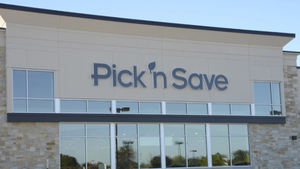SUPERMARKETS BEAT FOOD SERVICE IN FOOD-SAFETY SURVEY
DES MOINES, Iowa -- Supermarkets are doing an "excellent" job in protecting consumers against foodborne pathogens, with 62% of consumers approving of their retailer's food-safety programs, according to a new poll.The consumer attitudes survey, conducted in May 2000, questioned 401 randomly selected consumers and 150 newspaper and magazine food editors on a variety of food-safety issues. The consumer
October 23, 2000
DES MOINES, Iowa -- Supermarkets are doing an "excellent" job in protecting consumers against foodborne pathogens, with 62% of consumers approving of their retailer's food-safety programs, according to a new poll.
The consumer attitudes survey, conducted in May 2000, questioned 401 randomly selected consumers and 150 newspaper and magazine food editors on a variety of food-safety issues. The consumer survey has a margin of error of 4.9%.
In issues directly related to food safety, the poll noted that respondents favor safe-handling stickers for fresh meat and poultry, with more than three-fourths saying such stickers are "very important." However, they don't know specifically what information is on the stickers. Two in five consumers recall seeing specific handling instructions, a jump of 10% since 1999, while only about one-fourth of consumers recall specifics such as cooking instructions, cooking temperatures and storage instructions, researchers found.
The survey also reveals some good news for processors and retailers considering the sale of irradiated foods. While consumer awareness of irradiation remains steady at 53%, consumer confidence in the technology has increased. Some 57% rated irradiation as a very effective tool for ensuring the safety of meat and poultry products, up 10% from 1999. Roughly two-thirds of those who are aware of irradiation also said they were at least "somewhat likely" to purchase irradiated foods. However 62% said they would take action on the basis of negative media stories regarding food safety.
"Awareness of food technologies appears to significantly impact consumer acceptance," said Bill Brewer, CMF&Z vice president of public relations. "While consumers say they are willing to purchase irradiated foods, they also say they will take action if the technology is associated with a safety incident."
Fewer consumers could define genetically modified organisms. According to the poll, only 29% correctly responded that GMOs have been subject to a change in DNA. Another 23% could not define the term at all, and nearly one-half offered definitions that were vague or incorrect.
Functional foods fared even worse. Virtually none of the consumers questioned could correctly define the term. In fact, 51% did not know that a functional food contains potential health benefits beyond the traditional nutrients they provide, according to the researchers. Eleven percent said functional foods are foods necessary to survive; other responses included "healthy food," foods that are "easy to make" and "foods found in the basic food groups."
"This and other research tells us that consumers are largely unaware of advances in food technologies," said Dr. Thomas Hoban, professor of sociology and food science at North Carolina State University, Raleigh, N.C.
"The good news is that most consumers are actually quite positive about new food technologies once they understand the benefits and are confident that the foods are safe," he added. "It's imperative for the food and agriculture industries, with the help of the media, to deliver clear and concise consumer information on new developments in food production and processing."
Indeed, the survey revealed consumers believe natural and organic products are the safest types of food, ranking above food bought at grocery stores or food consumed in restaurants. More than two-thirds of respondents said so-called natural foods are "very safe," and 58% gave the same rating to organic foods.
"The data suggests that consumers believe that the 'safest' foods are those which have been exposed to minimal processing and have had minimal exposure to chemicals," said Brewer.
Consumers are less confident than they were a year ago in the ability of meat and poultry packers to ensure food safety -- in spite of major efforts to bolster testing and inspection of their products, according to the survey. About one-third (32%) of respondents said packers were doing an excellent job of ensuring a safe food supply, down from 38% a year ago. Just under one-half of those polled said processors are doing an excellent job in 2000.
"Consumer concerns about food safety appear to be incident driven," said Brewer. "Widespread media coverage of food-borne illnesses caused by E. coli, salmonella and listeria often identify packing plants as sources of the pathogens. Packers and governmental agencies are often seen in reactive roles, which may influence consumer perception and consumption."
In fact, the survey shows 92% of consumers said that would "take action" as a result of media coverage of bacteria in food, such as E. coli or salmonella. Another 88% said they would do the same in response to a hepatitis report.
For more information on the Food Safety Survey 2000, visit www.cmfz.com/foodsafety.
You May Also Like




